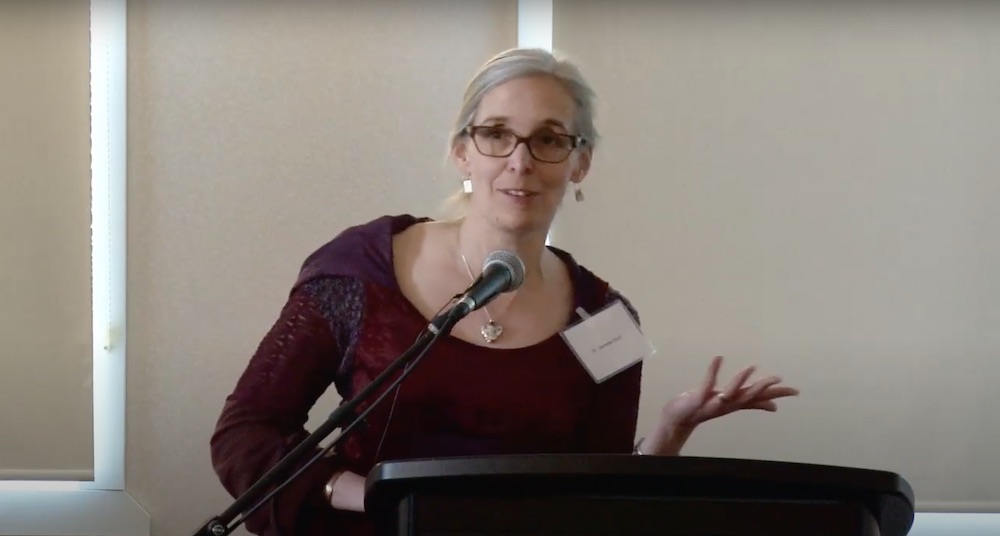The rise of corporate health-care providers in British Columbia is worrying, says Jeanette Boyd, president of the BC College of Family Physicians. But she says it really needs to be recognized as a symptom of a deeper disease.
Boyd, who has a family practice in Nelson, said she personally thinks corporate care is significant and “there should be concern about the real risk it has to further fragment health care in the province.”
“Absolutely they are filling a vacuum, but it’s a vacuum I feel is artificial and can be addressed in other ways,” she said. “If we all work together, we can potentially find solutions that don’t bring in the same inherent risk that bringing in a big corporate agency does.”
Boyd has practised in B.C. since 2007 and been president of the college for two and a half years. In a wide-ranging interview, she discussed the challenges to primary care, the threat corporate care poses, what she sees as the solutions and the government’s slow response.
“We know that care that is provided by a family physician working in a well-supported environment who is providing comprehensive, continuous longitudinal care is really where the best value is,” said Boyd.
Over time that relationship leads to improved outcomes for patients, increased rates of cancer detection, decreased amounts of chronic disease and better quality of life, she said. It also ultimately saves the publicly-funded system money.
And yet more than 700,000 people in B.C. lack access to a family physician.
The problem is not a shortage of doctors. The province is producing more family physicians than ever, she said, but the system encourages them to move into other areas of practice.
Doctors get into family medicine because they want to make a difference and value the long-term relationships involved in providing direct patient care, she said. But they find the fee-for-service system, where each visit or treatment is assigned a dollar value, doesn’t allow them to spend as much time with patients as they may need.
“The time it takes to provide that quality patient-centred care isn’t remunerated in a system that values more episodic care or volume of care as opposed to quality of care,” she said.
“It’s this constant battle between trying to balance the patient in front of you who is really important, but you still have 20 more patients in the waiting room that have booked appointments that also have important issues that need to be seen that day, and you need to see that many patients in order to meet your overhead to pay your staff in order for you to continue to work.”
It’s tricky to find a balance in clinics that are run on fee-for-service billings, she said. Family physicians are also now seeing patients with more complex needs, such as people with multiple diseases that need to be carefully managed.
“Frankly, the complexity of society has escalated as well,” Boyd said. “We see more and more the impacts of the social determinants of health and how to navigate those and the impact of the underlying prolonged chronic stress.”
Addressing those complex needs might require time put into counselling, for instance to help someone quit smoking or make other lifestyle changes, work that can take a decade or longer to show results. But that’s not covered in the current fee-for-service model.
Investing in that kind of care would pay dividends in the long term, she said. But political realities mean governments are looking ahead to the next election, not the long-term future.
“There is that need for the immediate gratification, and we know those investments in primary and preventative care, looking at dealing with the social determinants of health and access to housing, access to important food security, preventative health care, we don’t see the benefits of that until three or four or 10 election cycles,” she said.
So governments tend to focus on areas where they can have an immediate impact, like improving access to surgeries or urgent care, Boyd said.
“We’re seeing this disproportionate emphasis on things that are absolutely important, but perhaps aren’t leading to the longer term, high-quality impacts that we’re really needing to see for the broader sustainability of the health-care system overall.”
Corporations like Telus and Well Health Technologies Corp. have stepped into that fractured system.
They offer services that many patients find convenient, and it is understandable why doctors might choose to work for them, Boyd said. It’s a model where they can show up at work and earn a salary without the headaches or long-term responsibilities of running the business themselves.
“A lot of those challenges we know people working in comprehensive family medicine have identified, these corporate services are attending to.”
But there are concerns about the kind of care the corporations provide and how they affect the rest of the system, she said.
“It has the risk of even further pulling people away from family practice,” she said, “without the added benefits that comprehensive longitudinal care brings around ensuring continuity of care, around building relationships, getting to know a person over time and tailoring the care to what you know of them and their values and understanding the patient’s context.”

Corporate online care doesn’t provide that, Boyd said.
“You are not getting that with [Telus’s virtual care product] Babylon,” she said. “That is only episodic care. So there is risk without the real benefits.”
Boyd said use of corporate services often leads to extra costs for the system. Patients may consult the online service and then go to their doctor for the same issues. Duplicate tests may be ordered.
“There are several family physicians who have had patients see their Babylon doctor and then come into their office to attend to the same issue, or patients who’ve been directed to go to the emergency department by a doctor who works not in your small community,” she said. “I don’t think we’ve fully understood the significant repercussions of these corporate episodic care aspects at all.”
The provincial government could do much to improve primary care, Boyd said.
It needs to get rid of the fee-for-service payment model and instead create a system that facilitates high-quality care, she said.
“Without the independent family clinic, the whole system would fall apart, but it’s not remunerated reflective of the critical part of the infrastructure that it is,” Boyd said.
She argues for more flexible funding that would allow physicians to look at the community where they’re working, assess the needs particular to that place, and build a team with other health-care professionals who have the skills and resources to meet that population’s needs.
“When you ask the patient what they value, what they think is important to their health, it is being able to talk to somebody who knows them, who trusts them,” she said. “And we know that relationship, for people who’ve been able to access that relationship, that’s where we really see the true savings in terms of health care.
“If we were to look at broadening, really building a team of other providers around the family physician, to allow everybody to really be working at the top of their scope, I think we would definitely address those gaps around accessibility.”
There also needs to be opportunities for communities to say what’s important to them, she said, noting needs will be different in Prince George than in Richmond.
That approach is embraced in some of what the province has done, in particular the setting up of primary care networks, but hasn’t been broadly or consistently adopted, Boyd said.
“The current philosophies around primary care networks are amazing and great, but they haven’t quite made it to where they need to be around being truly focused on the needs of the community,” she said.
Well-planned primary care networks would be centred on a community’s needs and let physicians who are on the frontline decide what’s needed, she said.
The public needs to understand that access to quality primary care matters and that over the long run it will have a big impact on their health, she said.
“Having a well-supported relationship with their family doctor, embedded in a team, is going to be more meaningful and significant than just being able to call the doctor on Babylon,” she said. “And the care they’re going to get will be different.”
That means a government commitment to building a system that allows for high-quality care, that will attract and keep physicians and that values the doctor-patient relationships that are known to have the biggest impacts on people’s health, Boyd said.
Everybody deserves that kind of care, she said. “Unfortunately, right now the system is completely opposite.” ![]()
Read more: Health, Science + Tech

















Tyee Commenting Guidelines
Comments that violate guidelines risk being deleted, and violations may result in a temporary or permanent user ban. Maintain the spirit of good conversation to stay in the discussion.
*Please note The Tyee is not a forum for spreading misinformation about COVID-19, denying its existence or minimizing its risk to public health.
Do:
Do not: